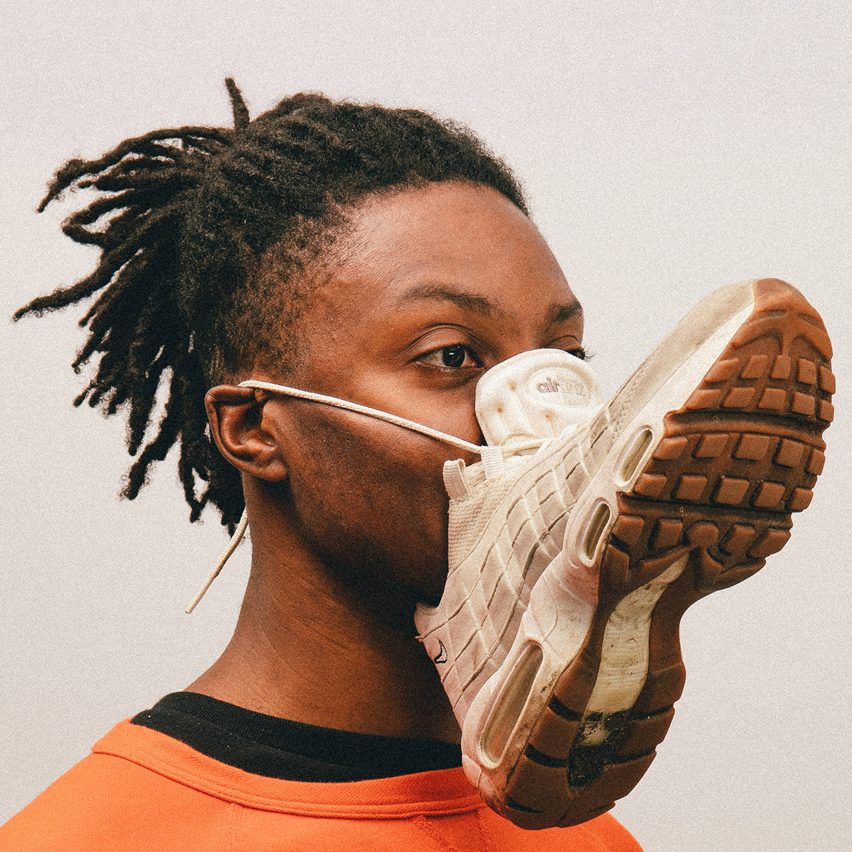
Artist and designer Max Siedentopf has apologised for offending people with his photos of home-made coronavirus masks, adding that his work aims to take people "out of their comfort zone".
"I apologise to everyone that felt offended by the series, it was never my intention," the Namibian-German artist told Dezeen.
"Most of my work takes a critical and often ironical look at our surroundings," he added. "It's important for me to take people out of their comfort zone and see things from a different perspective, both positively and negatively."
"But, ultimately, it's up to them to interpret my work as they want to."
The series of images, called How-To Survive A Deadly Global Virus, triggered angry comments from Dezeen readers, with many describing the project as insensitive and offensive.
Commenter A. Gil described the project as "insensitive and misinforming" while KauKau said it "risks spreading misinformation". Reader 73,336 and counting called Dezeen's post "an idiotic, insensitive and dangerous article".
Seidentopft created the series after seeing online images of people who fashioned makeshift masks out of household items out of fear of contracting coronavirus.
His images include models wearing masks made of vegetables, underwear and shoes.
Approximately 2,000 people have died after contracting the coronavirus, which originated in Wuhan, China. The virus has now spread to other countries around the world.
As well as the risk of infection, there have been numerous reports of racist incidents towards people of Chinese descent since the outbreak began.
However, Siedentopf rejected accusations that his project is racist.
"The majority of the critique was that the series was 'against Chinese' as the virus started there," he said.
"However, since the virus quickly spread globally, the masks were inspired by photos I came across from all over the world, ranging from young Instagrammers to DIY Pinterest boards with mask inspiration and, my personal favourite, a US man who was wearing a complete tent inside a plane to protect himself."
"To reflect on this, the masks I created were worn by people from China, Israel, Namibia, South Africa, Brazil, England, Ireland and Zimbabwe," he added.
"There has been a lot of media clickbait paranoia around the virus"
Siedentopf said he made the series of portraits to draw attention to paranoia and media coverage of the outbreak, rather than to make fun of the health crisis.
"I was expecting to uncloud the subject a little, focusing on the creativity of the masks and how through a barrier or problem you can still find smart and creative solutions, as over the last two weeks there has been a lot of media clickbait paranoia around the virus, even though the Chinese Centre for Disease Control reported that over 80 per cent of cases have been extremely mild," he explained.
"To put this into perspective, Malaria kills one to three million people per year, but you don't see the news and public going crazy about that."
Masks not effective protection against coronavirus
The artist based the masks on various examples of home-made alternatives to masks that people have created in response to the outbreak of coronavirus. Since the start of the outbreak, global demand for surgical face masks has surged, despite research showing they have limited effectiveness in preventing the spread of viruses.
According to reports, wearing a surgical mask for extended periods could even put a wearer at greater risk as it traps virus particles. The World Health Organization (WHO) has published advice on basic protective measures against coronavirus on its website, which includes washing hands regularly and maintaining distance from other people.
Although some people have been critical of Siedentopf's work, he believes that it is good that the project has provoked discussion.
"Overall the majority of reactions were exceptionally positive, but I think it's also good and healthy that there have been also negative and critical reactions, which made people think critically and speak out about a serious state of affairs."
The coronavirus outbreak is being treated as a global emergency by WHO. In total, more than 75,000 cases have been reported in China with around 1,000 reported in other countries.
A new hospital has been built in Wuhan to treat patients and several design shows in China have been postponed due to the outbreak.
The post Max Siedentopf apologises for offence caused by images of coronavirus masks made of everyday items appeared first on Dezeen.
from Dezeen https://ift.tt/3298iLC
No comments:
Post a Comment